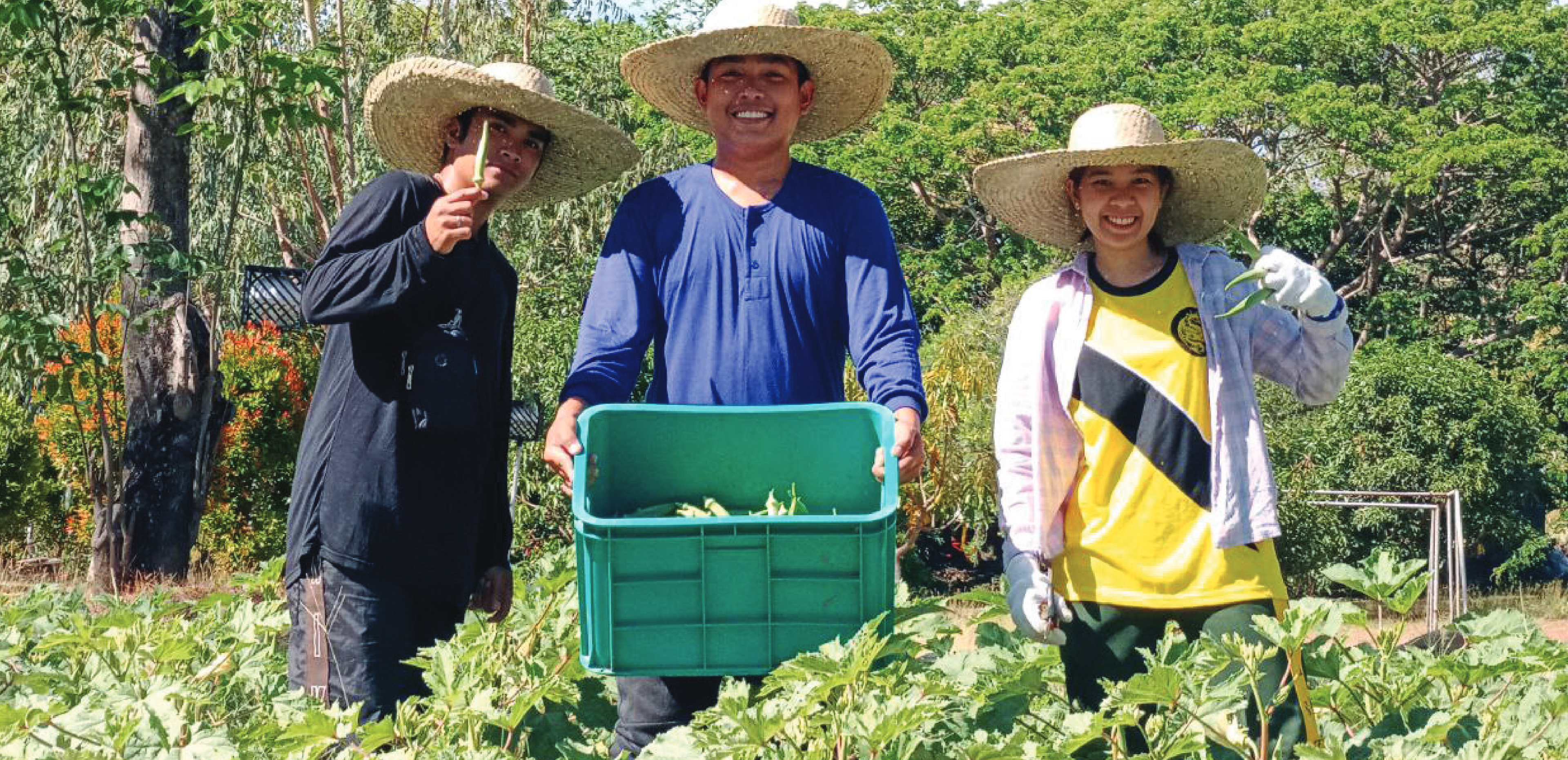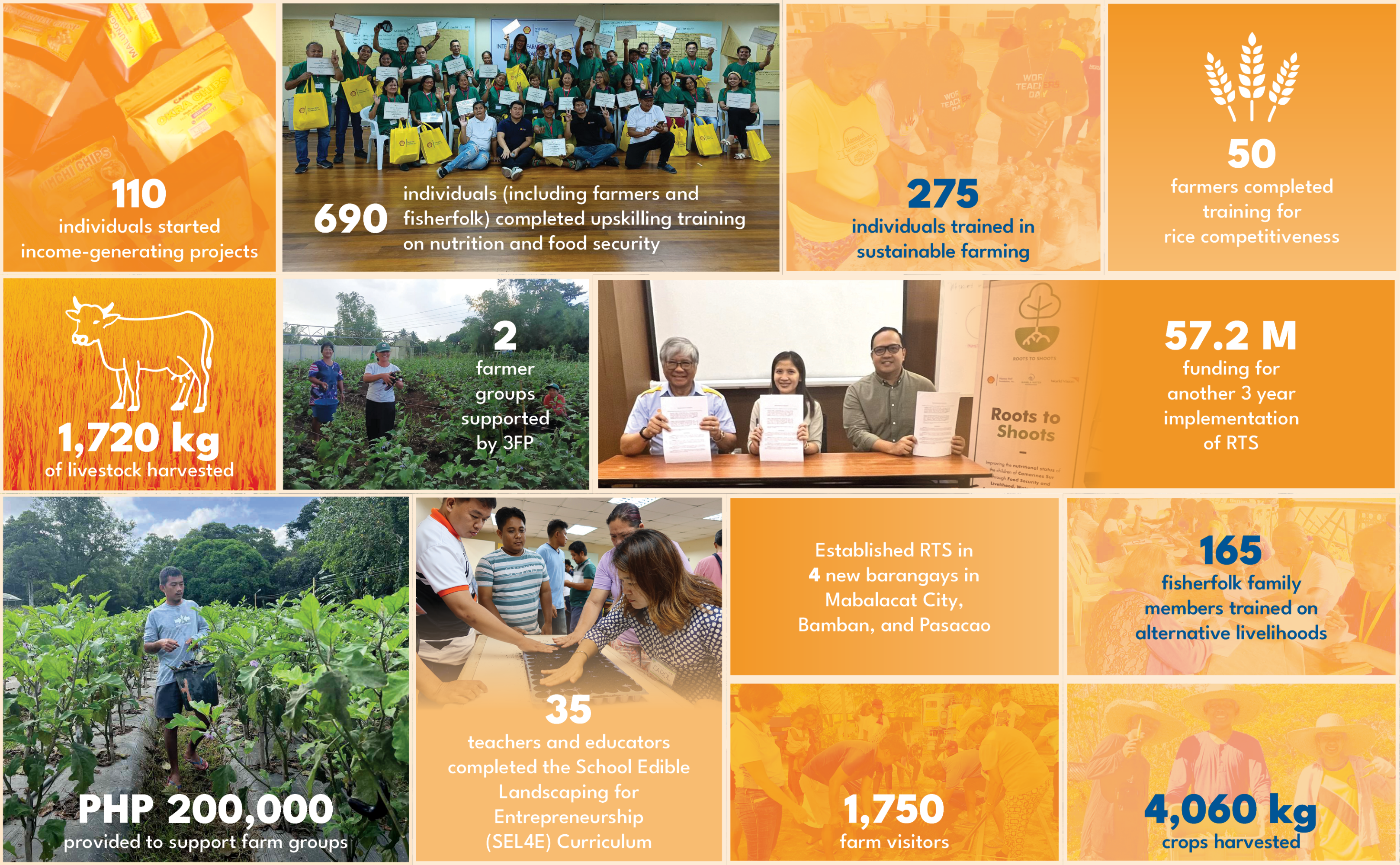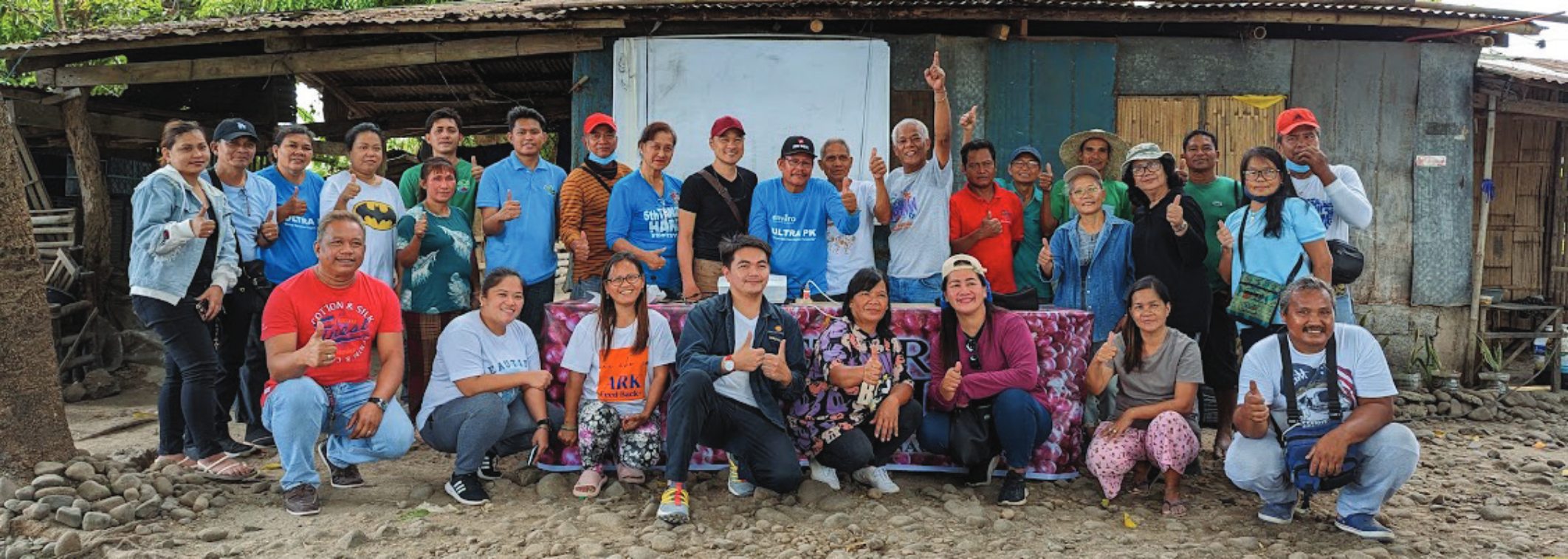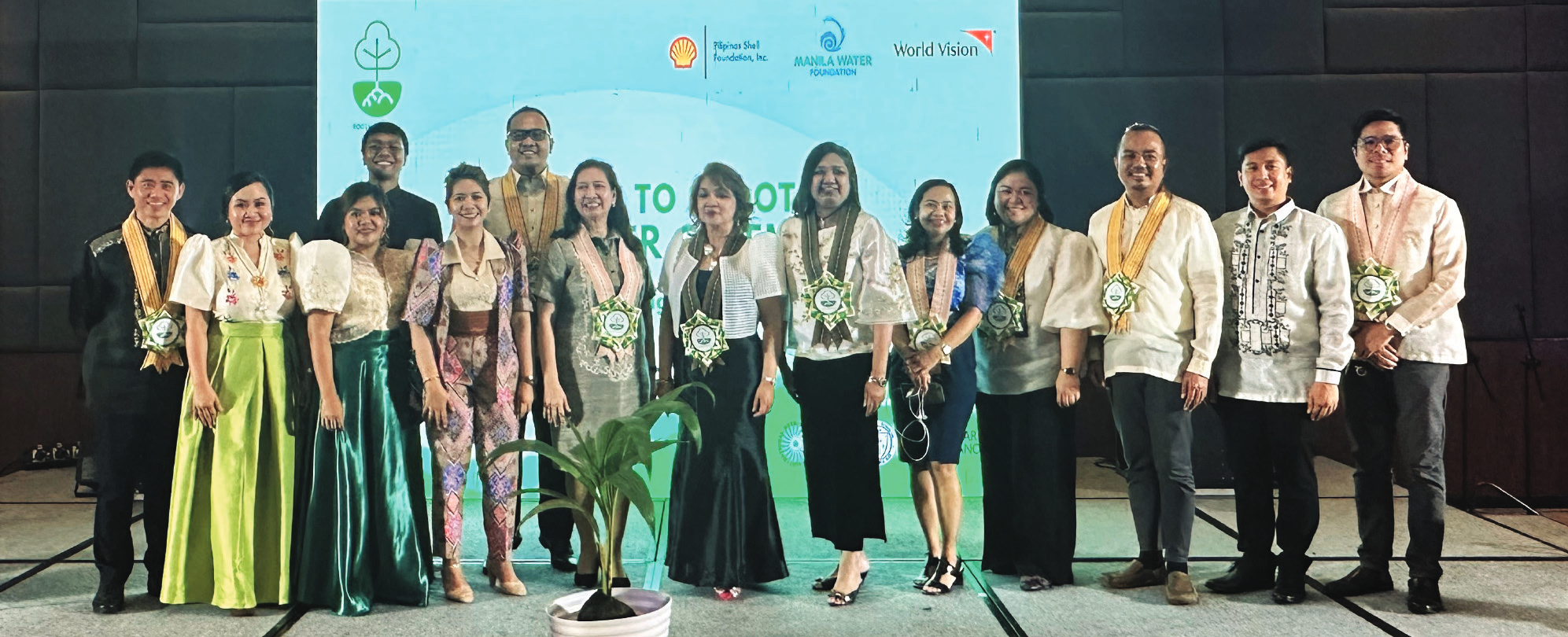
Nutrition and Food Security
Aligned with UN SDG 2: Zero Hunger, PSFI targets malnutrition and food insecurity to foster a healthier society. Nutrition and Food Security programs contribute to solving these issues by promoting sustainable agriculture, improving access to nutritious food and clean water, and enabling good nutrition behavior.
Nutrition and Food Security
Aligned with UN SDG 2: Zero Hunger, PSFI targets malnutrition and food insecurity to foster a healthier society. Nutrition and Food Security programs contribute to solving these issues by promoting sustainable agriculture, improving access to nutritious food and clean water, and enabling good nutrition behavior.
2023 at a Glance

Transformation Stories
● Cherry Burlas — President of Sitio Calitang Fishermen Cooperative (SCAFICO), Palawan
● Linebeth Sacabon — Farmer and entrepreneur, Camarines Sur
● Mark Ernie Cordero — Entrepreneur and president of the Young Farmers Organization of Pamplona and Libmanan, Camarines Sur
● Hannah Louise Belza — Entrepreneur and certified public accountant, Camarines Sur
● Reynaldo Estadilla — Member of Baras Rabbit Meat Association, Rizal
● Magarao Vegetable Grower Association (MAVEGA) — Camarines Sur
● Siembre Agrarian Reform Beneficiaries Organization (SARBO) — Camarines Sur
Shell Training Farm (STF)
Shell Training Farms are facilities established to help improve the agricultural productivity of smallholder farmers with programs on agricultural education, innovative farming technologies and systems, and sustainable agricultural approaches. These facilities and activities are primarily in Bombon, Camarines Sur, and Pililla, Rizal.
In 2023, STF held various trainings for 650 farmers

and community members. Because of the program’s contributions, the Department of Agriculture-Bicol awarded STF Bombon as the Best Project Implementer during the First DA Bicol Civil Society Organization Summit. The program faced challenges like delayed sales of farm products, an extended dry season, and an avian flu outbreak. Despite these issues, local and regional partners helped STF and its beneficiaries thrive. In particular, PSFI looks forward to its continued partnership with the Embassy of Japan in the Philippines and completing the Food Processing Training Center in Bombon. With PSFI’s commitment to continuously learning and adapting, STF continues to help communities become more resilient.
Palawan Eco-Agro Park (PEAP)
PSFI extended STF to El Nido, Palawan, and launched the Palawan Eco-Agro Park in 2019 to improve farm productivity, food accessibility, and the locals’ quality of life while protecting the environment. PEAP is a central hub for agriculture and entrepreneurship, where locals can gain valuable skills and start income-generating projects through various trainings.
In 2023, these initiatives successfully upskilled participants and helped increase their household income. 202 individuals completed trainings on alternative livelihood sources and enterprise management, and 104 implemented various income-generating projects.
To supplement PEAP’s efforts, PSFI relaunched the El Nido Food Terminal in 2023 to bring produce directly from farmers to consumers. As one of the program’s main local partners, the Asosasyon ng mga Magsasaka at Mangingisda sa Munisipyo ng El Nido, Inc. (AMMMENI) manages the food terminal. 104 farmers benefited from the project, generating PHP 12.7 million in total sales.
Kitchen City
PSFI piloted this program in 2023 to link Rizal farmers to Kitchen City, one of the country’s biggest food concessionaires. This collaboration has successfully enhanced smallholder farmers’ food security and economic conditions while ensuring a steady supply of fresh, locally sourced produce to Kitchen City.
Rice Competitiveness Enhancement Fund Program (RCEFP)
PSFI integrated the Rice Competitiveness Enhancement Fund Program (RCEFP) into STF to support rice farmers by teaching modern farming techniques, pest management, and high-yield practices to improve productivity and sustainability. In 2023, PSFI empowered 50 rice farmers with updated rice production and management knowledge. Participants completed 112 hours of the Production of High-Quality Inbred Rice, Seed Certification, and Farm Mechanization Training.
Integrated Farming Bio-systems (IFBS)
The Integrated Farming Bio-systems program introduces farming technologies to farmers, focusing on communities in Bombon and Pililla, to address challenges like environmental pollution and the high cost of inputs. IFBS promotes sustainable crop production and animal husbandry, agroforestry, converting farm wastes into biofertilizers, and farm entrepreneurship.
In 2023, 258 farmers graduated from IFBS training at the Bombon and Pililla Shell Training Farms. Out of these participants, 75 individuals increased their annual agricultural income. The program also offers other training courses for upskilling, which 245 individuals completed within the year. As a result, 80 participants from Bombon were able to implement various income-generating projects.
IFBS also supports farmers by equipping them with capital. For 2023, the program provided PHP 20,000 to PHP 40,000 cash assistance each to three farmer groups from Pililla to help launch their enterprises.
Future Filipino Farmer Project (3FP)
The Future Filipino Farmer Project was initially launched in 2018 to advance sustainable agriculture in the country. To expand this, PSFI implemented 3FP Phase II in 2022 to explore the feasibility of a climate-smart and rice-based farming model tailored to local farmers. This was piloted with two farmers’ groups in Bombon and Magarao. In 2023, these groups received farm inputs, construction materials, and IFBS training from PSFI to support their growth. A total of 20 farmers attended the three-day IFBS training.
Despite the long dry season and the avian flu, 3FP was successful in 2023. It accomplished 82.5% of its production targets with 169 heads of livestock, 6.4 tons of rice, 3.4 tons of vegetables, and 5 tons of organic fertilizers.
Research and Development for Agriculture
PSFI’s Research and Development for Agriculture program explores and introduces potential sustainable technologies that benefit smallholder farmers.
Establishing the Camarines Sur and Rizal Participatory Guarantee System (PGS) Groups is one of its current initiatives. Once established as Organic Certifying Bodies (OCBs), this will improve smallholder farmers’ access to obtaining organic certification. PSFI actively participates as part of the technical team in charge of the Rizal PGS and the Camarines Sur core groups.
Roots to Shoots (RTS)
Roots to Shoots uses a multi-sectoral approach to address child malnutrition and food insecurity, targeting 13 barangays in Bombon and Pasacao in Camarines Sur for its first three years of implementation. PSFI engages with the Manila Water Foundation (MWF) and the World Vision Development Foundation (WVDF) to execute activities within the program’s three components: Food Security and Livelihood (FSL), Water Access, Sanitation, and Hygiene (WASH), and Mother and Child Care (MCC). The program has secured substantial support from local governments and organizations and formed partnerships with other non-profits. In 2023, PSFI collaborated with the Metrobank Foundation, Inc. and Bloomberry Cultural Foundation, Inc. (BCFI) to expand the program.
From 2019 to 2022, the program achieved its targets and transformed many lives. Stunting decreased by 10.57% in Pasacao and 7.45% in Bombon; wasting decreased by 5.39% in Pasacao and 2.46% in Bombon; and the number of underweight children decreased by 6.91%in Pasacao and 4.32% in Bombon. In 2023, PSFI focused on transitioning RTS into a self-sustaining local initiative to sustain the program’s impacts.
Following this success, PSFI engaged with the Clark Development Corporation (CDC) and BCFI to establish Phase II Aeta Family Care Centers: Roots to Shoots (FCC-RTS). This builds on the CDC’s existing Aeta Family Care Center initiative to address the specific needs of the target communities. RTS will support these new sites within the next three years.
Food Security and Livelihood (FSL)
PSFI spearheads the Food Security and Livelihood (FSL) component of RTS to improve access to affordable and nutritious food so that it meets the recommended dietary requirements. Its interventions include boosting communities’ agricultural production and augmenting their entrepreneurial skills. As a result of the trainings conducted, 157 caregivers and 97 farmers increased their income, and 599 households have better access to nutritious food from home gardens or communal farms.

In 2023, PSFI and BPI Foundation, Inc. (BPIF) began their collaboration to implement the Agricultural Services to Elevate Farmers towards Sustainable Food Security and Livelihood (AgrElevate). AgrElevate is a farm-to-table program that aims to address the challenges faced by fisherfolk in the Municipality of Leyte through capacity development, sustainable livelihood, market support, and financial literacy. This is in line with RTS’ future efforts to reach out to other communities and address the specific needs they face.
Water Access, Sanitation, and Hygiene (WASH)
MWF oversees the Water Access, Sanitation, and Hygiene (WASH) component, leveraging its water and sanitation expertise. This program aims to protect communities from waterborne diseases and improve access to clean water by building infrastructure and promoting good hygiene practices. As a result, WASH has improved hygiene and sanitation for 102 households.
Mother and Child Care (MCC)
The Mother and Child Care (MCC) component, led by WVDF, focuses on rehabilitating malnourished children by equipping caregivers with essential knowledge and best practices through the Positive Deviance/Hearth (PDH) and Go Baby Go! Parenting programs. These community-based approaches empower caregivers to provide the best possible care, leading to 558 underweight children achieving normal weight.
